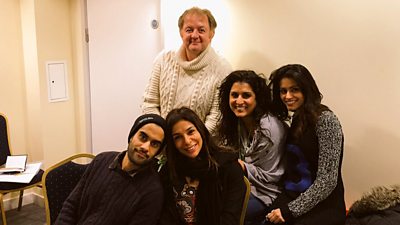After winning the last year I was tasked with developing a Radio Play. The idea that I wanted to develop wasn’t “The Spoken Word” which was the play that won the award. Instead there was an idea that I knew well even though at this early stage it was only a paragraph:
Beware of spoilers:
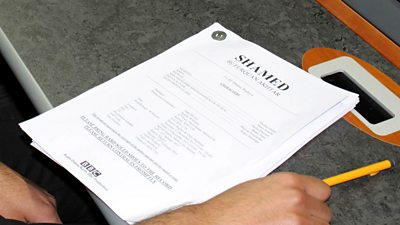
Shabana is grieving for her son. She's recently lost him and has to deal with people coming to her home and mourning on her behalf. Nevertheless she accepts this and carries on for the sake of her daughter in law and young grandson who live with her. Her daughter in law Aisha is less accepting of Shabana's mourning and as Shabana slowly makes her way through the seven stages of grief we begin to hear more about what happened to her son. The "mourners" who come to her door are not there to mourn his death but to offer their condolences for his imprisonment. Rizwan was arrested for grooming.
Looking back at this now. It’s clear that this paragraph is a scene not a play but I knew who the characters were. This is what made me pursue the idea because even though from the outset it may seem like a controversial idea I felt that if I could ground the characters then the script would be about the family’s turmoil which in turn would make it feel tragic yet relatable.
After this; it was time to write the “Offer”. My radio “” was Gary Brown who mentored me throughout the process and went on to produce and direct . He described the offer process as:
Basically it is a two page short story. The commissioner needs to know the shape of the story and how it ends. Don't get bogged down in too much detail - but it is important to know who is at the centre of the story and whose Point of View we are following.
Sage advice. I beated out the story and tried to shape it around my protagonist “Shabana”. At the moment it felt a bit linear. It was important to be true to the reality of a case such as this but also make it feel dramatic enough so it was engaging. Eventually I had my two page treatment which took us on Shabana’s journey but there was one scene that stood out.
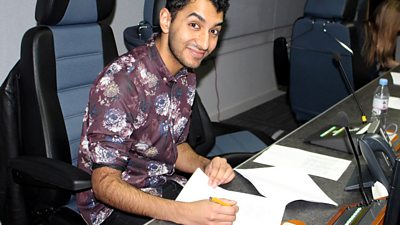
I haven’t admitted to Gary that I started writing “Shamed” before it was commissioned. I was daunted by the prospect and I thought that I could change that feeling by writing the bits that came to me when I was in the shower or driving down the M62. If I could get those bits down then I could apply them to the structure later. I’m not sure if this is a “good way” of writing however I tend to write out of order. I have these conversations with myself in which I play all of the characters in my head and then I just start hitting the keyboard in the vain hope that something good will happen. I kept hearing the final conversation in my head between Rizwan and Shabana and that turned out to be the first thing I wrote. It was a long and painful scene but even at this early stage it meant so much to me. I started piecing the rest of the play together using my treatment as a template and highlighting each beat when I felt I had achieved it. Writing the play before it had been commissioned made the wait much more bearable because at the very least I would have a new spec script!
However Gary returned with word from the commissioner that the play had been commissioned. Hurrah. He set me my first deadline (approximately a month). I played along and told him it was doable although I had already written a sizable chunk. Sorry Gary.
Writing for Radio is a weird experience because you have to keep thinking about how the audience will experience your words based solely on sounds. Essentially sound is the grammar for the medium. I know that sounds obvious but it’s quite difficult. For example what are the noises to tell us we’re in a prison and how do you write that in a script? As I went through the process the sounds that I would hear became clearer.
The first wait for notes was excruciating. I had no idea what to expect and my writer paranoia was off the scale. I listened to a lot of melancholy music that week and quickly understood how sold so many records. However the notes came in. I read them with great trepidation but overall it was a solid first draft. There were techniques that I thought would lend itself to radio that in actual fact made it feel dated. That was eye opening being told that your way of looking at the medium was a bit old fashioned. Nevertheless it was great to have another pass at the script.
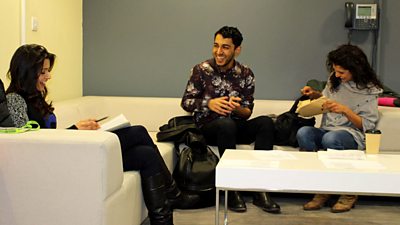
The anxiety always ramped up between each draft process. It was exciting yet nerve wracking but I didn’t feel like I had quite got under the skin of the play until Gary and I had a big face to face edit. We pulled apart dialogue and examined character motivation. I realised there were justifications in my head that weren’t necessarily on the page – how on earth would anyone know what they are. Good point.
After that big edit I knew what was needed from the play. It would be facetious to say it clicked because the face to face edit and the subsequent draft took a lot of work but what I will say is that when you’re so invested in something you naturally want to make it the best it can be. That’s how I felt about “Shamed” from the outset. Therefore when the script was complete I felt that I had written my strongest script to date.
The day of the recording was so exciting. Gary had secured a fantastic cast (, , , , and .)
Maya is a dear friend and a great actress and in fact Sacha Dhawan was who I had in mind when I was writing for Rizwan. Shobna Gulati has been a friend for nearly five years now. That sounds like a name drop but there is an important reason behind this. Diversity seems like a hot topic at the moment. The first time I met Shobna she said to me “Nice to meet you and nice to see you”. I’ve always remembered this because it reminded me how important it is for diversity in media. “Shamed” was a play that wasn’t there to tick boxes but instead to hear a story from a viewpoint that’s not often heard. The fact that we had such a diverse cast is something I’m really proud of.
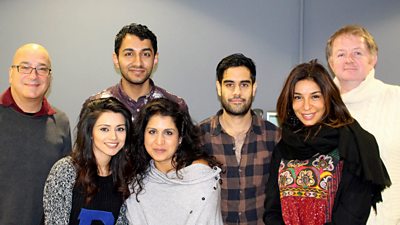
Gary asked me if I was happy after every scene was completed and we worked in collaboration to make sure that the dialogue flowed. It’s surprising how you don’t hear a speech that jars until it’s performed. At least then you know the line hasn’t worked and the great thing about radio is that you have a chance to fix it.
On the morning of the second day of recording we were about to record the scene I felt was the most important play of the day; the final scene between Rizwan and Shabana. I was blown away by Shobna and Sacha’s dedication and even though I’d written it – their performances were so engaging I was completely rapt.
The whole experience surpassed my expectations and I am so excited to hear the final project.
who wrote nearly 600 episodes of Corrie and approximately 50 radio plays said to me that writing for radio is a privilege as it’s one of the few avenues in which you can really write what you want to write about. This may be my first commission but the freedom I’ve experienced has been nothing short of…a privilege.
